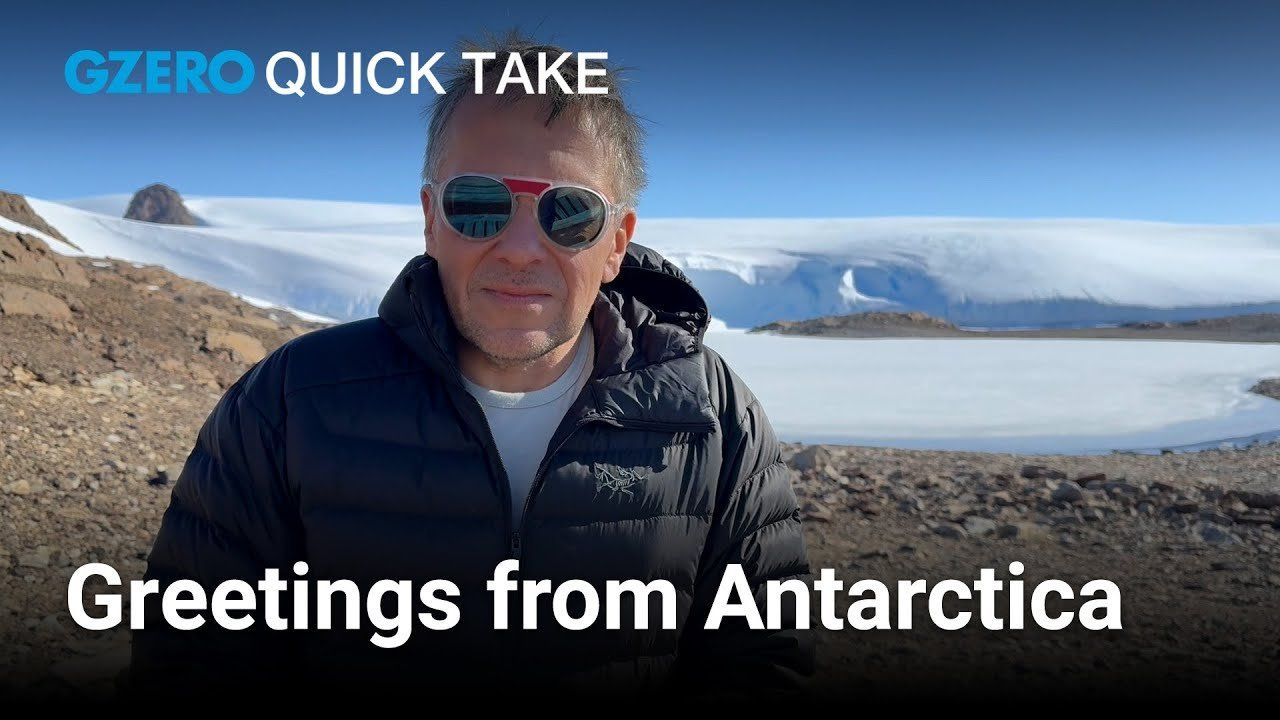January 04, 2024
Ian Bremmer's Quick Take: Hi everybody. Ian Bremmer here and a Happy New Year 2024 from Antarctica.
That's actually where I am in a year where we're going to have, unfortunately, so much international conflict, so much geopolitical posturing, so much difficulty around the world. Seems like a good place to take a fresh start to kick off the year one continent that is actually free of that conflict and free because the world has decided to govern it well, the Antarctic. They used to be territorial claimants with overlapping claims, old colonial powers, and countries that were closed, whether it's Chile, Argentina, France, the United Kingdom, Australia, others. But they all suspended those claims as they entered into an Antarctic Treaty back in 1959.
For the duration of that treaty, which still is in place today and will be, we think, for at least decades to come. That means that Antarctic is free and clear of territorial claims and also free and clear of any military use or any natural resource exploitation, any commercialization. Now, instead, it's used for peaceful and scientific purposes for the benefit of humanity on this planet, and it has been running as such for over 60 years, despite the fact that there's no enforcement mechanism for this treaty. It's a very thin document, and everybody basically engages to try to ensure that over time we'll all work together, and so far, so good.
In fact, right now I'm closest to a Russian research base and an Indian base. Even though those are countries that don't get along incredibly well, they manage to still socialize and share weather information, other data, you wouldn't know that they're from different countries. In fact, that's true of the Americans and the Chinese and pretty much everybody that's here on the ground in Antarctic. Now, part of the reason for that is because there's very few people on the ground. It's really hard to get here. There are no indigenous people whose land has been taken away and who have claims upon it.
So in a sense, the very remoteness has made it comparatively easier to govern. Also, the fact that no one has seen huge profit in it, and over time, that could change as the space rate race heats up and people see that basing rockets in the Antarctic or satellite tracking could be useful and have military purposes, commercial applications. Maybe as we're going to Mars. Certainly also, as we talk about rare earths and the ability to extract minerals from the earth. There'll be more discussion of this, but for now, at least 8 billion people on the planet and the Antarctic is run pretty darn well.
Now, climate change has made a difference, and I've seen that with emperor penguin colonies getting smaller and glaciers receding, but it still seems very far away, this continent, from what we've been experiencing pretty much everywhere else, and so nice to reflect on that for a moment as we kick off 2024. I hope everyone enjoyed their New Year. I'll be back in the States real soon and I'll be talking to you about topics that are very close to our heart and a little more challenging to talk about.
That's it for me. I'll talk to you all real soon.
From Your Site Articles
More For You
A photograph posted by U.S. President Donald Trump on his Truth Social account shows him sitting next to CIA Director John Ratcliffe as they watch the U.S. military operation in Venezuela from Trump's Mar a Lago resort, in Palm Beach, Florida, U.S., January 3, 2026.
@realDonaldTrump/Handout via REUTERS
Most Popular
- YouTube
In this "ask ian," Ian Bremmer analyzes Trump’s recent meeting with Zelensky and how close (or far) Russia and Ukraine are from a peace deal.
Syrian President Ahmed al-Sharaa attends the military parade of the Syrian army in Umayyad Square in central Damascus to mark the one-year anniversary of the fall of the Assad regime, on Dec. 8, 2025.
Mohammed Al-Rifai/dpa via Reuters Connect
A year ago this month, Syria’s brutal dictatorship collapsed. There are signs of recovery, but sectarian violence threatens to undermine the optimism.
© 2025 GZERO Media. All Rights Reserved | A Eurasia Group media company.
